need和dare用法小结
- 格式:doc
- 大小:32.50 KB
- 文档页数:3
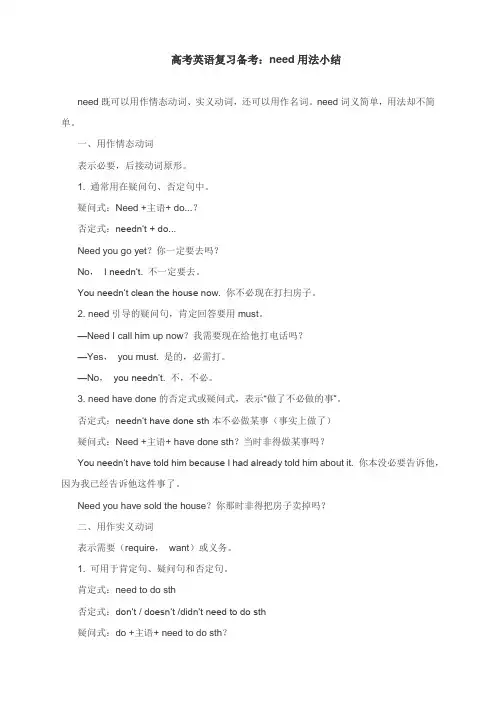
高考英语复习备考:need用法小结need既可以用作情态动词、实义动词,还可以用作名词。
need词义简单,用法却不简单。
一、用作情态动词表示必要,后接动词原形。
1. 通常用在疑问句、否定句中。
疑问式:Need +主语+ do...?否定式:needn’t + do...Need you go yet?你一定要去吗?No,I needn’t. 不一定要去。
You needn’t clean the house now. 你不必现在打扫房子。
2. need引导的疑问句,肯定回答要用must。
—Need I call him up now?我需要现在给他打电话吗?—Yes,you must. 是的,必需打。
—No,you needn’t. 不,不必。
3. need have done的否定式或疑问式,表示“做了不必做的事”。
否定式:needn’t have done sth本不必做某事(事实上做了)疑问式:Need +主语+ have done sth?当时非得做某事吗?You needn’t have told him because I had already t old him about it. 你本没必要告诉他,因为我已经告诉他这件事了。
Need you have sold the house?你那时非得把房子卖掉吗?二、用作实义动词表示需要(require,want)或义务。
1. 可用于肯定句、疑问句和否定句。
肯定式:need to do sth否定式:don’t / doesn’t /didn’t need to do sth疑问式:do +主语+ need to do sth?I need to consult a dictionary. 我需要查词典。
She doesn’t need to do the cooking. 她不必做饭。
Does she need to do the cooking?她需要做饭吗?Yes,she does. 是的,她需要做饭。

need的用法总结分析以下是小编为大家整理的need的用法总结,希望能帮助大家更好地认识need这个单词,提高英语水平。
need 的用法:“need”既可以作情态动词,也可以作实义动词,但是它们的用法不同。
作为情态动词的“need”的用法与其他情态动词“can”,“may”,“must”的用法基本相同:在限定动词词组中总是位居第一,没有非限定形式,即没有不定式、-ing分词或-ed分词等形式;第三人称单数现在时没有词形变化;情态动词之间是相互排斥的,即在一个限定动词词组中只能有一个情态动词。
下面是“need”作为情态动词的用法:一、need表示“需要”或“必须”,通常用于否定句和疑问句。
例如:1.You needn't do it again.你不需要再做了。
2.He needn't worry about it.这件事他无需担心。
3.Need he do this homework first?他需要先做这些作业吗?4.Need they fill in the form?他们需要填表吗?二、needn't后的不定式间或也能用进行式或被动语态。
例如:1.He needn't be standing in the rain.他不必要站在雨中。
2.We needn't be waiting in this place.我们不必要在这儿等。
3.The hedges needn't be trimmed thisweek.本周树蓠不必要整修。
三、在否定句中,可以用need的否定形式+不定式完成体。
例如:1.We needn't have worried.其实我们不必要慌。
2.You needn't have mentioned it.你本来不必提起这件事。
3.You needn't have said that when he asked.当他问的时候,你其实不必要说。
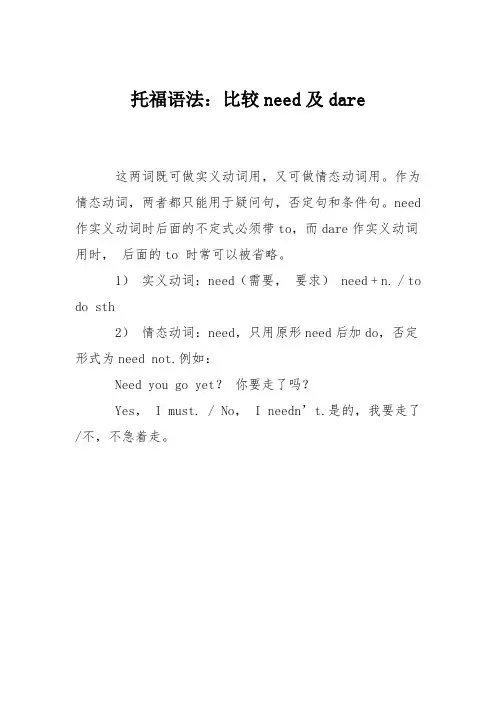
托福语法:比较need及dare
这两词既可做实义动词用,又可做情态动词用。作为
情态动词,两者都只能用于疑问句,否定句和条件句。need
作实义动词时后面的不定式必须带to,而dare作实义动词
用时, 后面的to 时常可以被省略。
1) 实义动词:need(需要, 要求) need + n. / to
do sth
2) 情态动词:need,只用原形need后加do,否定
形式为need not.例如:
Need you go yet? 你要走了吗?
Yes, I must. / No, I needn’t.是的,我要走了
/不,不急着走。
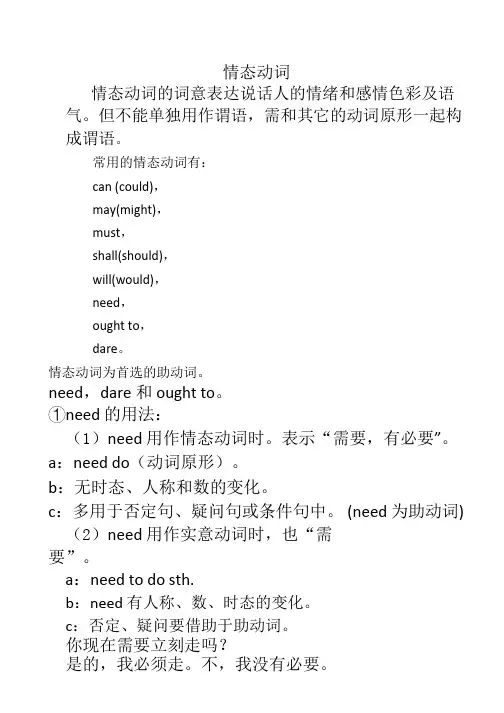
情态动词情态动词的词意表达说话人的情绪和感情色彩及语气。
但不能单独用作谓语,需和其它的动词原形一起构成谓语。
常用的情态动词有:can (could),may(might),must,shall(should),will(would),need,ought to,dare。
情态动词为首选的助动词。
need,dare 和 ought to。
①need 的用法:(1)need 用作情态动词时。
表示“需要,有必要”。
a:need do(动词原形)。
b:无时态、人称和数的变化。
c:多用于否定句、疑问句或条件句中。
(need 为助动词) (2)need 用作实意动词时,也“需要”。
a:need to do sth.b:need 有人称、数、时态的变化。
c:否定、疑问要借助于助动词。
你现在需要立刻走吗?是的,我必须走。
不,我没有必要。
Need you go at once?Yes, I must.No, I needn’t.我需要立刻走。
I need to go at once.我没有必要立刻走。
I don’t need to go at once.你现在需要立刻走吗?Do you need to go at once?Yes, I do.No, I don’t.——有谁需要看医生吗?——是的,小强需要看医生。
—Need anyone see a doctor?—Does anybody need to see a doctor?—Yes, XQ needs to see a doctor.你没有必要今天工作到那么晚,你可以明天完成的。
You needn’t work too late today, you can finish it tomorrow. You don’t need to work too late today注:need to be done = need doing需要被… …花儿需要浇水了。
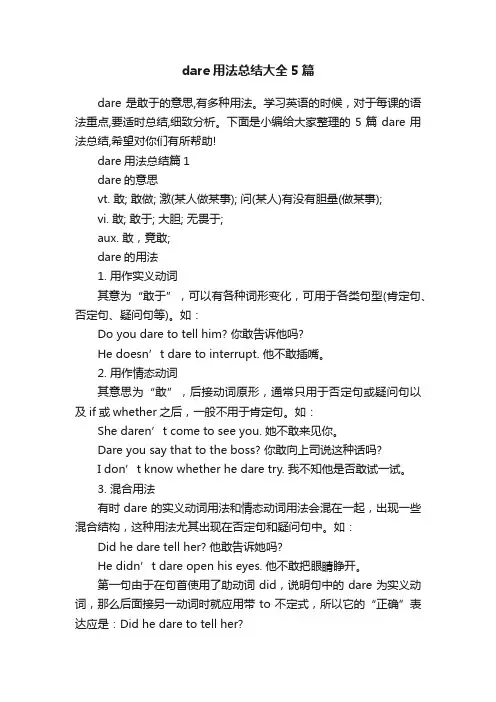
dare用法总结大全5篇dare是敢于的意思,有多种用法。
学习英语的时候,对于每课的语法重点,要适时总结,细致分析。
下面是小编给大家整理的5篇dare用法总结,希望对你们有所帮助!dare用法总结篇1dare的意思vt. 敢; 敢做; 激(某人做某事); 问(某人)有没有胆量(做某事);vi. 敢; 敢于; 大胆; 无畏于;aux. 敢,竟敢;dare的用法1. 用作实义动词其意为“敢于”,可以有各种词形变化,可用于各类句型(肯定句、否定句、疑问句等)。
如:Do you dare to tell him? 你敢告诉他吗?He doesn’t dare to interrupt. 他不敢插嘴。
2. 用作情态动词其意思为“敢”,后接动词原形,通常只用于否定句或疑问句以及if或whether之后,一般不用于肯定句。
如:She daren’t come to see you. 她不敢来见你。
Dare you say that to the boss? 你敢向上司说这种话吗?I don’t know whether he dare try. 我不知他是否敢试一试。
3. 混合用法有时dare的实义动词用法和情态动词用法会混在一起,出现一些混合结构,这种用法尤其出现在否定句和疑问句中。
如:Did he dare tell her? 他敢告诉她吗?He didn’t dare open his eyes. 他不敢把眼睛睁开。
第一句由于在句首使用了助动词did,说明句中的dare为实义动词,那么后面接另一动词时就应用带to不定式,所以它的“正确”表达应是:Did he dare to tell her?第二句由于在dare前使用了助动词didn’t,说明其中的dare为实义动词,所以当后接另一动词时应该用带to不定式,所以这一句的“正确”表达应是:He didn’t dare to open his eyes.这样的用法尽管我们阅读中可能会遇到,但最好不要模仿,因为如果考试中用它有可能会被判定为错误噢!4. I dare say前面我们讲过,dare用作情态动词通常不用于肯定句,但是I dare say是个例外,并且它已成为一个习惯说法,用于表示一种不肯定的语气,它的意思是“很可能”“大概”“我想”等。
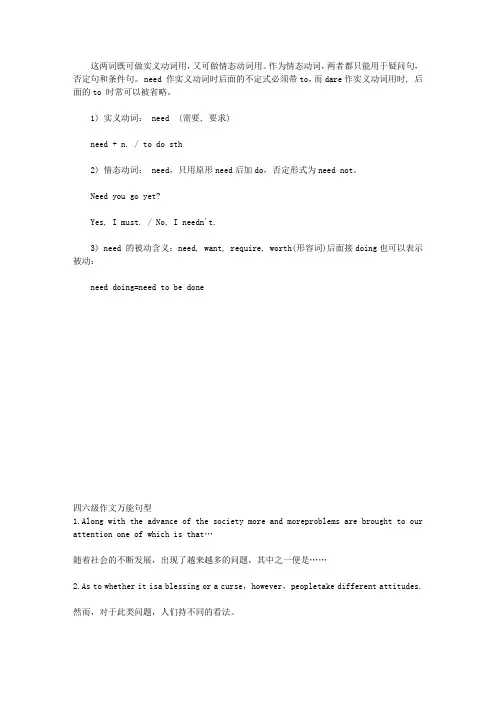
这两词既可做实义动词用,又可做情态动词用。
作为情态动词,两者都只能用于疑问句,否定句和条件句。
need 作实义动词时后面的不定式必须带to,而dare作实义动词用时, 后面的to 时常可以被省略。
1) 实义动词: need (需要, 要求)need + n. / to do sth2) 情态动词: need,只用原形need后加do,否定形式为need not。
Need you go yet?Yes, I must. / No, I needn't.3) need 的被动含义:need, want, require, worth(形容词)后面接doing也可以表示被动:need doing=need to be done四六级作文万能句型1.Along with the advance of the society more and moreproblems are brought to our attention one of which is that…随着社会的不断发展,出现了越来越多的问题,其中之一便是……2.As to whether it isa blessing or a curse,however,peopletake different attitudes.然而,对于此类问题,人们持不同的看法。
3.As society develops,people are attaching much Importance to…随着社会的发展,人们开始关注……4.People are attaching more and more importance to theinterview during job hunting.求职的程中,人们慢慢意识到面试的重要性。
5.As to whether it is worthwhile.there is a long runningcontroversial debate It is quite natural that people from different bac kgrounds may have divergent attitudes towards it.关于是否值得的问题,一直以来争论不休。
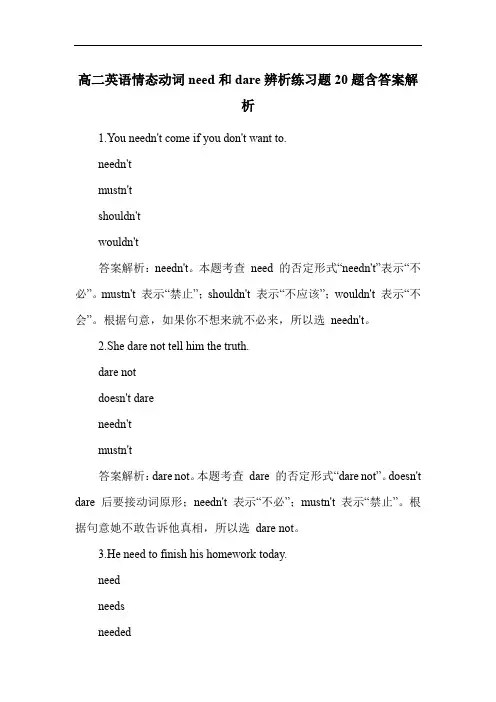
高二英语情态动词need和dare辨析练习题20题含答案解析1.You needn't come if you don't want to.needn'tmustn'tshouldn'twouldn't答案解析:needn't。
本题考查need 的否定形式“needn't”表示“不必”。
mustn't 表示“禁止”;shouldn't 表示“不应该”;wouldn't 表示“不会”。
根据句意,如果你不想来就不必来,所以选needn't。
2.She dare not tell him the truth.dare notdoesn't dareneedn'tmustn't答案解析:dare not。
本题考查dare 的否定形式“dare not”。
doesn't dare 后要接动词原形;needn't 表示“不必”;mustn't 表示“禁止”。
根据句意她不敢告诉他真相,所以选dare not。
3.He need to finish his homework today.needneedsneededneedn't答案解析:needs。
本题考查need 做实义动词时的用法。
主语是he,谓语动词要用第三人称单数形式needs。
need 做情态动词时后面接动词原形,不用to;needed 时态不对;needn't 表示“不必”不符合句意。
4.Do you dare to climb that tree?dare todaredaren'tneedn't答案解析:dare to。
本题考查dare 做一般疑问句的用法。
dare 做实义动词时疑问句要用助动词do 提问,后面接to do;dare 做情态动词时疑问句直接用dare 提前,本题后面有to,所以选dare to。
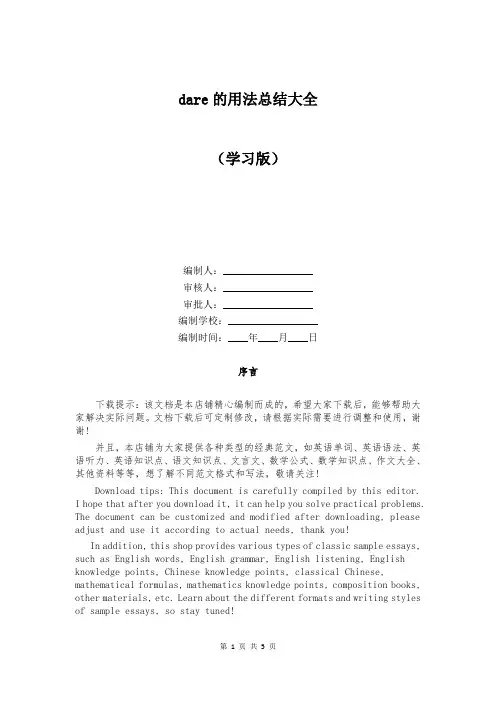
dare的用法总结大全(学习版)编制人:__________________审核人:__________________审批人:__________________编制学校:__________________编制时间:____年____月____日序言下载提示:该文档是本店铺精心编制而成的,希望大家下载后,能够帮助大家解决实际问题。
文档下载后可定制修改,请根据实际需要进行调整和使用,谢谢!并且,本店铺为大家提供各种类型的经典范文,如英语单词、英语语法、英语听力、英语知识点、语文知识点、文言文、数学公式、数学知识点、作文大全、其他资料等等,想了解不同范文格式和写法,敬请关注!Download tips: This document is carefully compiled by this editor.I hope that after you download it, it can help you solve practical problems. The document can be customized and modified after downloading, please adjust and use it according to actual needs, thank you!In addition, this shop provides various types of classic sample essays, such as English words, English grammar, English listening, English knowledge points, Chinese knowledge points, classical Chinese, mathematical formulas, mathematics knowledge points, composition books, other materials, etc. Learn about the different formats and writing styles of sample essays, so stay tuned!dare的用法总结大全dare的意思vt.敢; 敢做; 激(某人做某事); 问(某人)有没有胆量(做某事);vi.敢; 敢于; 大胆; 无畏于;aux.敢,竟敢;dare的用法1. 用作实义动词其意为“敢于”,可以有各种词形变化,可用于各类句型(肯定句、否定句、疑问句等)。
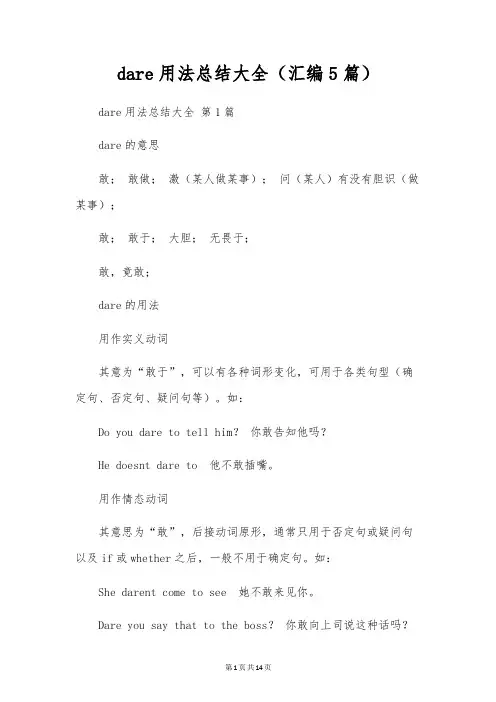
dare用法总结大全(汇编5篇)dare用法总结大全第1篇dare的意思敢;敢做;激(某人做某事);问(某人)有没有胆识(做某事);敢;敢于;大胆;无畏于;敢,竟敢;dare的用法用作实义动词其意为“敢于”,可以有各种词形变化,可用于各类句型(确定句、否定句、疑问句等)。
如:Do you dare to tell him?你敢告知他吗?He doesnt dare to 他不敢插嘴。
用作情态动词其意思为“敢”,后接动词原形,通常只用于否定句或疑问句以及if或whether之后,一般不用于确定句。
如:She darent come to see 她不敢来见你。
Dare you say that to the boss?你敢向上司说这种话吗?I dont know whether he dare 我不知他是否敢试一试。
混合用法有时dare的实义动词用法和情态动词用法会混在一起,显现一些混合结构,这种用法尤其显现在否定句和疑问句中。
如:Did he dare tell her?他敢告知她吗?He didnt dare open his 他不敢把眼睛睁开。
第一句由于在句首使用了助动词did,说明句中的dare为实义动词,那么后面接另一动词时就应用带to不定式,所以它的“正确”表达应是:Did he dare to tell her?第二句由于在dare前使用了助动词didnt,说明其中的dare为实义动词,所以当后接另一动词时应当用带to不定式,所以这一句的“正确”表达应是:He didnt dare to open his这样的用法尽管我们阅读中可能会碰到,但最好不要仿照,由于假如考试中用它有可能会被判定为错误噢!I dare say前面我们讲过,dare用作情态动词通常不用于确定句,但是I dare say是个例外,并且它已成为一个习惯说法,用于表示一种不愿定的语气,它的意思是“很可能”“大约”“我想”等。
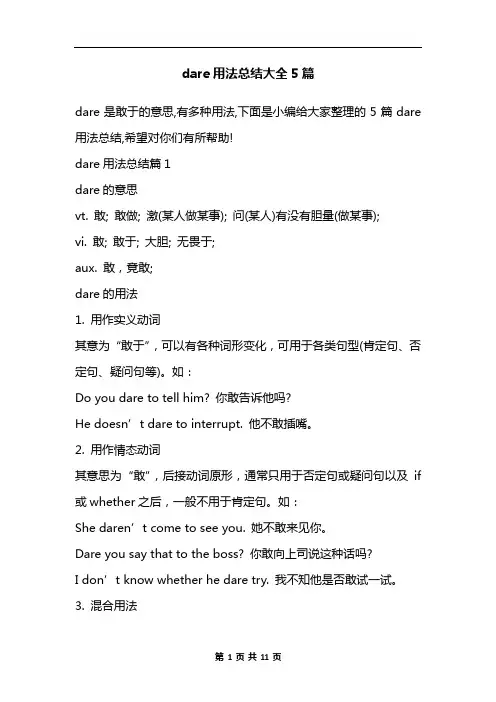
dare用法总结大全5篇dare是敢于的意思,有多种用法,下面是小编给大家整理的5篇dare 用法总结,希望对你们有所帮助!dare用法总结篇1dare的意思vt. 敢; 敢做; 激(某人做某事); 问(某人)有没有胆量(做某事);vi. 敢; 敢于; 大胆; 无畏于;aux. 敢,竟敢;dare的用法1. 用作实义动词其意为“敢于”,可以有各种词形变化,可用于各类句型(肯定句、否定句、疑问句等)。
如:Do you dare to tell him? 你敢告诉他吗?He doesn’t dare to interrupt. 他不敢插嘴。
2. 用作情态动词其意思为“敢”,后接动词原形,通常只用于否定句或疑问句以及if 或whether之后,一般不用于肯定句。
如:She daren’t come to see you. 她不敢来见你。
Dare you say that to the boss? 你敢向上司说这种话吗?I don’t know whether he dare try. 我不知他是否敢试一试。
3. 混合用法有时dare的实义动词用法和情态动词用法会混在一起,出现一些混合结构,这种用法尤其出现在否定句和疑问句中。
如:Did he dare tell her? 他敢告诉她吗?He didn’t dare open his eyes. 他不敢把眼睛睁开。
第一句由于在句首使用了助动词did,说明句中的dare为实义动词,那么后面接另一动词时就应用带to不定式,所以它的“正确”表达应是:Did he dare to tell her?第二句由于在dare前使用了助动词didn’t,说明其中的dare为实义动词,所以当后接另一动词时应该用带to不定式,所以这一句的“正确”表达应是:He didn’t dare to open his eyes.这样的用法尽管我们阅读中可能会遇到,但最好不要模仿,因为如果考试中用它有可能会被判定为错误噢!4. I dare say前面我们讲过,dare用作情态动词通常不用于肯定句,但是I dare say是个例外,并且它已成为一个习惯说法,用于表示一种不肯定的语气,它的意思是“很可能”“大概”“我想”等。
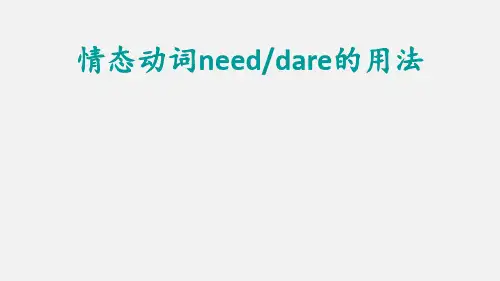
【初中英语】情态动词must和have to,dare和need的用法情态动词指本身有一定的词义,用来表示语气的单词,但是不能独立作谓语,只能和动词原形一起构成谓语,情态动词虽然数量较多,用途广泛,是各类考试都一定会考查的重点。
这次就来和大家讲讲must/have to,dare/need这两组词的用法。
must/have to:① 表示必须、必要,在回答问句时,如果是否定的,必须用needn’t, don’t have toeg. ---- Must I finish my homework before dinner?---- Yes, you must.---- No, you don’t have to / you needn’t.② must是说话人的主观看法,而have to则强调客观需要,have可根据时态人称的变化而变化eg.That film is interesting,I really must go to watch.You have to get to school before 8 am.③ 表示推测、可能性(只用于肯定的陈述句)eg.You must know that,you are a teacher.dare/need:① dare作情态动词用时, 常用于疑问句、否定句和条件从句中eg.How dare you say that to me?② need 作情态动词用时, 常用于疑问句、否定句eg. Need I finish my homework before dinner?③ dare和 need也可以做实义动词来用,独自充当谓语。
eg.The little girl dares to go to school by herself.感谢您的阅读,祝您生活愉快。
情态动词重难点小结一、 need的用法1. need作情态动词,一般用于疑问句和否定句中,表示“需要”、“必要”。
当其用于现在时和将来时时,在宾语从句中可当过去时用。
肯定回答用must(或have to, ought to, should) 来表达。
否定式为need not / needn't表示“不必,不需要”。
如:(1) You needn't show your passport at the entrance unless the guard asks you for it.(2) —shall I tell Jack about it?—No, you needn't. I've told him already.2. need作实义动词,意为“需要”、“要求”。
如:(1) You don't need to leave so early.(2) He needs to try one more experiment.二、 dare 的用法1. 情态动词,表示“敢”,后接动词原形,用于否定句、疑问句和条件状语从句中。
如:(1) We dare not refuse their request.(2) Dare you walk through the forest at night?2. 当实义动词用时,可用于各种句型中。
dare作实义动词用在否定句和疑问句中时,其后接不定式有时可省去“to”。
如:(1) Does he dare to come?(2) She dares to speak in front of big audience.(3) I have never dared (to) speak to him.三、 can、be able to 和could的用法1. can和be able to都表示“能力”。
但can只有现在时和过去时,而be able to则有更多的形式。
初中need知识点总结Need是初中英语中的重要知识点之一,它是表示需要或者必须的意思。
在初中英语学习中,Need的用法非常广泛,掌握好它的用法对于学生的语言表达和理解能力非常重要。
本文将从Need的基本用法、否定形式、疑问形式、特殊疑问形式、反意疑问形式等方面对Need的知识点进行总结。
一、Need的基本用法1. Need作为实义动词,表示需要或者必须,后面可以直接接名词、代词、不定式等作宾语。
例如:- I need a computer to finish my homework.- She needs to go to the hospital for a check-up.- We need some help from you.2. Need作为情态动词,表示需要或者必须,后面接动词原形作谓语,不带to。
例如:- You needn't worry about it.- He needn't do his homework now.- She needn't study so hard for the exam.3. Need作为名词,表示需要的东西,常用于形容词或不定冠词修饰。
例如:- We have many needs in our life.- He bought some food and other daily needs.二、Need的否定形式Need的否定形式有两种:情态动词和实义动词的否定形式。
1. 情态动词的否定形式为needn't,表示不需要或者不必须做某事。
例如:- You needn't take an umbrella. It's not going to rain.- They needn't come to my birthday party if they are busy.2. 实义动词的否定形式为does not/doesn't need,表示不需要或者不必须做某事。
Need的用法1. need 是英语中两个比较特殊的动词之一(另一个是dare),既是及物动词又是情态动词。
作情态动词用多见于英国英语中,而且仅用在否定句和疑问句中。
如:2. need 作情态助动词通常不用在肯定句中(*He need go now.), 但在表示怀疑或否定概念的主句之后的宾语分句里或主语分句里,可以用情态助动词的肯定形式。
如:I don’t think you/ he need go just yet.I wonder if we need take sleeping-bags.The only thing you need to do is (to) fill in this form.(=You don’t need to do anything else。
)All you need do is to take a taxi from the airport.情态动词need的肯定式主要用在正式文体中。
在非正式文体中,need 作及物动词用也许更普遍。
如:I wonder if we need to take sleeping-bags.I don’t think he needs to go just yet.The only thing you need to do is (to) fill in this form.3. need 没有过去、现在的时态区别。
如果要表示过去时间可用“need have + -ed分词”的结构。
如:Need you have told him about my plans?You needn’t have told him about my plan.据CGoEL, You need not have done it. 几乎等于You did not need to do it. 但是,need have+-ed 分词结构隐含有与事实相反的意思,need to 的结构则没有。
2021届人大附中高中英语新高考语法一轮复习讲义(18)半情态动词(ought to,need,dare,used to)知识点总结整理这一期学习几个半情态动词(ought to,need,dare,used to)的用法——Ought toOught to 之后接原形动词在谈论愿景或理想的事时可以用ought to例:They ought to build more parks in the city centre.(他们应该在城市中心建更多的公园)We ought to eat lots of fruit and vegetables every day.(我们每天应该吃大量的水果和蔬菜)ought to也可表推论,译为“应当会”例:There ought to be some good films at the cinema this weekend.(这周末电影院应当会有一些不错的电影)Since he works hard,he ought to (should)succeed(由于他很努力,应该会成功)Ought to have + 过去分词本应当……Ought to have + 过去分词用来传达过去的理想或理想状况,但并没有发生,传达出某种遗憾,等于should have + 过去分词例:We ought to have locked the gate. Then the dog wouldn’t have got out.(我们本应该锁门的,那样狗就不会出去了)——Needneed同样为半情态动词,作情态助动词时,主要用在否定句中,与not连用,后接动词原形。
We needn’t spend much time on this topic.(我们不需要花太多时间在这个话题上)在疑问句中,need可做助动词或一般动词例1:Does he need to go?(一般动词)例2:Need he go?(助动词)他需要去吗?needn’t have + 过去分词本不需要……用来表示已经发生了但说话者觉得没有必要的事You needn’t have waite d for me.(你本不需要等我的)You needn’t have bought so much food. (你本不要买这么多实物的)need也可做一般动词,具有人称及时态的变化,之后接不定式短语或名词作宾语。
need和dare用法小结
最近的一次考试中出现了这么一道题:
After the glasses fell to the ground and broke, the little boy his grandma about that.
A. dare not tell
B. dare not telling
C. dare not to tell
D. didn’t dare tell
答案选D。
可90%的学生都选了A。
这一现象引起了笔者的关注。
情态动词一直都是高中英语语法中的重难点,而其中的need和dare是难点中的难点。
因为这两个单词有其独特性,它们既可以作情态动词又可以用作实义动词。
学生对此掌握得一直不到位。
笔者根据自己多年的教学经验,现将其归纳如下:
一、need(必须、需要)的用法
1、need用作情态动词
作情态动词,need一般用于否定句、疑问句和条件句中,没有人称和数的变化,也没有时态的变化,后接动词原形。
例如:I needn’t finish my homework today.
Need you go now? (请注意回答语:Yes, I must. / No, I needn’t.) *“needn’t have done”表示“本不必做而做了”
You needn’t have watered the flowers, because I watered them just now.
There is a lot of time left. We needn’t have taken a taxi.
2、need用作实义动词
作实义动词,need可用于任何句子中,并且有人称、数和时态的变化,后接名词、代词和动词不定式。
例如:I need a new car.
We need to finish our homework today.
need还有一个特殊的用法:need doing=need to be done (此用法相当于want 和require)
例如:The flowers need watering.=The flowers need to be watered. 这些花需要浇水。
*didn’t need to do(不必做而没做)
needn’t have done(本不必做而做了)
--- You d idn’t wait for him last night, did you?
---No, and we ____. He didn’t return home at all.
A couldn’t have
B didn’t need to
C needn’t have
D needn’t
解析:didn’t need to 表示过去没有做而实际上也没有必要
needn’t have (waited) 过去做了而实际上没有必要。
二、dare(敢)的用法
1、dare用作情态动词
作情态动词,dare一般用于否定句和疑问句中,没有人称和数的变化,但是有过去时(dared),后接动词原形。
例如:I dare not go out alone at night. 晚上我不敢一个人出去。
I dared not go out alone last night. 昨晚我不敢一个人出去。
Miss Zhao asked me if I dared sleep alone.
If you ever dare call me that name again, you’ll be sorry.
你胆敢再那样叫我, 你会后悔的。
How dare he say such rude things about me?
* I dare say是惯用语,意为“我想”、“我恐怕”。
I dare say you are right. 我想你是对的。
It’ll rain tomorrow, I dare say. 恐怕明天要下雨。
2、dare用作实义动词
作实义动词,dare可用于任何句子中,并且有人称、数和时态的变化,后接名词、代词和动词不定式。
例如:You should dare to express your feelings. 你应该敢于表达自己的感情。
I’ve never dared to overeat. 我从不敢吃太多。
Do you dare to enter the cave? 你敢进那个洞吗?
* dare实义动词用于否定句和疑问句中后面to可省略。
My sister doesn’t dare(to)go out when night falls. 天一黑我妹妹就不敢出去了。
Do you dare (to ) swim across the river?你敢游过这条河吗?。